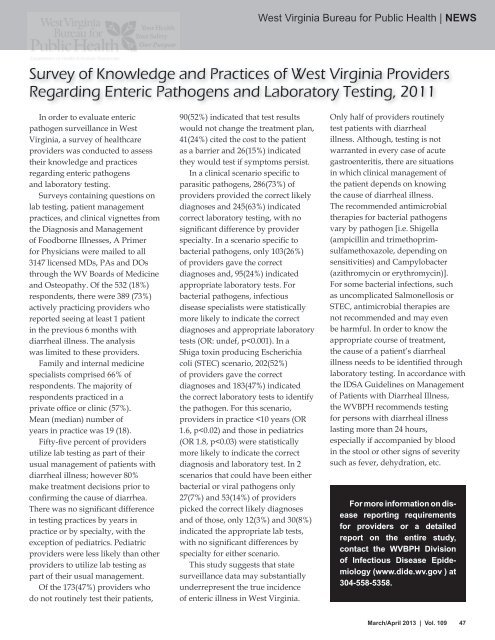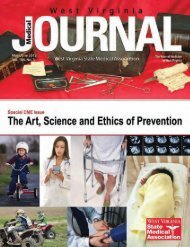March/April - West Virginia State Medical Association
March/April - West Virginia State Medical Association
March/April - West Virginia State Medical Association
Create successful ePaper yourself
Turn your PDF publications into a flip-book with our unique Google optimized e-Paper software.
<strong>West</strong> <strong>Virginia</strong> Bureau for Public Health | NEWS<br />
Survey of Knowledge and Practices of <strong>West</strong> <strong>Virginia</strong> Providers<br />
Regarding Enteric Pathogens and Laboratory Testing, 2011<br />
In order to evaluate enteric<br />
pathogen surveillance in <strong>West</strong><br />
<strong>Virginia</strong>, a survey of healthcare<br />
providers was conducted to assess<br />
their knowledge and practices<br />
regarding enteric pathogens<br />
and laboratory testing.<br />
Surveys containing questions on<br />
lab testing, patient management<br />
practices, and clinical vignettes from<br />
the Diagnosis and Management<br />
of Foodborne Illnesses, A Primer<br />
for Physicians were mailed to all<br />
3147 licensed MDs, PAs and DOs<br />
through the WV Boards of Medicine<br />
and Osteopathy. Of the 532 (18%)<br />
respondents, there were 389 (73%)<br />
actively practicing providers who<br />
reported seeing at least 1 patient<br />
in the previous 6 months with<br />
diarrheal illness. The analysis<br />
was limited to these providers.<br />
Family and internal medicine<br />
specialists comprised 66% of<br />
respondents. The majority of<br />
respondents practiced in a<br />
private office or clinic (57%).<br />
Mean (median) number of<br />
years in practice was 19 (18).<br />
Fifty-five percent of providers<br />
utilize lab testing as part of their<br />
usual management of patients with<br />
diarrheal illness; however 80%<br />
make treatment decisions prior to<br />
confirming the cause of diarrhea.<br />
There was no significant difference<br />
in testing practices by years in<br />
practice or by specialty, with the<br />
exception of pediatrics. Pediatric<br />
providers were less likely than other<br />
providers to utilize lab testing as<br />
part of their usual management.<br />
Of the 173(47%) providers who<br />
do not routinely test their patients,<br />
90(52%) indicated that test results<br />
would not change the treatment plan,<br />
41(24%) cited the cost to the patient<br />
as a barrier and 26(15%) indicated<br />
they would test if symptoms persist.<br />
In a clinical scenario specific to<br />
parasitic pathogens, 286(73%) of<br />
providers provided the correct likely<br />
diagnoses and 245(63%) indicated<br />
correct laboratory testing, with no<br />
significant difference by provider<br />
specialty. In a scenario specific to<br />
bacterial pathogens, only 103(26%)<br />
of providers gave the correct<br />
diagnoses and, 95(24%) indicated<br />
appropriate laboratory tests. For<br />
bacterial pathogens, infectious<br />
disease specialists were statistically<br />
more likely to indicate the correct<br />
diagnoses and appropriate laboratory<br />
tests (OR: undef, p















